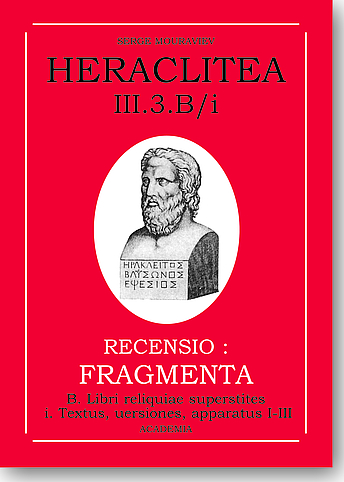Sonderegger
Proklos. Grundkurs über Einheit
ISBN 978-3-89665-270-6
englischThis book is the first German translation of Proclus's Stoicheiosis Theologike and follows Dodds's text, which is included unchanged. An introduction begins by locating the text among Proclus's other works and Neo-Platonism in general. In doing so, it emphasises the philosophically relevant side of Neo-Platonism but without denying other aspects of cultural life in the late antiquity. Indeed, behind this restriction is the conviction that the pure intellectualism and reasoning in 'Grundkurs über Einheit' is indispensable for anyone questioning the issue of unity in our diverse world; and that this text, with its strong style regarding the question of the essence and importance of unity, still has something to tell us.
The accompanying commentary hopes to offer a means by which the reader can find a way through this difficult and abstract text whose literary style differs greatly from Proclus's commentaries. It is a reading guide containing explanations on the train of thought contained in single paragraphs and the connections between groups of paragraphs.
The investigation of the text's intellectual substance presents a picture which deviates from the usual Neo-Platonic representation. While Proclus uses the word 'theological' in the title, and the Gods seem to play a central role in the text; the standard interpretation of this term has been too strongly led by the Christian understanding of 'theological.' With this word, Proclus is referring not to the rational treatment of religious experiences and concepts, but rather he is applying the contemporary conceptualisation of the gods as models to demonstrate the real concern, namely, Unity.
For the first time we are presented with a representation of this text which isn't orientated on a Christian theological reading. The result of this investigation is that, instead of questioning the status of gods, we find Proclus attempting to determine what 'being' means through the concepts of remaining, procession and reversion. Neither this concepts, nor the hypostases describe notions of particular areas or phases of existence, rather, they are the constituents of every existing thing. The hypostases prove to be the varying forms of unity and spheres of relative stability, within which every being is.
Das vorliegende Buch enthält die erste deutsche Übersetzung der Stoicheiosis Theologike von Proklos nach dem Text von Dodds, der unverändert beigegeben ist. Eine Einleitung setzt den Text zunächst in seinen Zusammenhang mit dem sonstigen Werk von Proklos, dann aber auch mit dem Neuplatonismus generell. Dabei liegt das Schwergewicht auf der philosophisch relevanten Seite des Neuplatonismus, ohne deswegen die anderen Aspekte dieser spätantiken Denkweise zu leugnen. Doch steht hinter dieser Einschränkung die Überzeugung, dass gerade das rein Gedankliche und Argumentative im Grundkurs über Einheit für alle, die in unserer vielfältigen Welt nach Einheit fragen, unverzichtbar sei und dass dieser Text in seiner strengen Art im Hinblick auf die Frage nach dem Wesen und dem Stellenwert von Einheit uns noch etwas zu sagen hat.
Der Kommentar möchte der Leserin und dem Leser Mittel an die Hand geben, sich in diesem schwierigen, weil abstrakten Text mit einem literarischen Stil, der sich von den Kommentaren des Proklos stark unterscheidet, zurecht zu finden. Er ist eine Lesehilfe. Er enthält deswegen hauptsächlich Erläuterungen zu den Gedankengängen einzelner Paragraphen und zum Zusammenhang von Paragraphengruppen.
Die Untersuchung des gedanklichen Gehaltes dieser Schrift ergibt ein Bild, das von der üblichen Darstellung des Neuplatonismus in einigen Punkten abweicht. Zwar verwendet Proklos sogar im Titel das Wort 'theologisch', und die Götter scheinen im Text faktisch eine Rolle zu spielen. Doch hat sich die Standardinterpretation im Verständnis des 'Theologischen' viel zu sehr vom christlichen Standpunkt leiten lassen. Proklos verweist mit diesem Wort im Titel gar nicht auf die rationale Bewältigung religiöser Erfahrungen und Vorstellungen, er benutzt vielmehr eine zeitgenössische Vorstellung von den Göttern als Mustern von Einheit dafür, auf das eigentliche Thema, eben die Einheit, hinzuweisen.
Hier liegt erstmals eine Darstellung vor, die sich nicht an der christlichen theologischen Rezeption für das Verständnis des Textes orientiert. Statt Fragen nach dem Status von Gott und von Göttern - so das Resultat der Untersuchung - finden wir bei Proklos den Versuch, mit den Begriffen Ruhe - Hervorgang - Rückkehr zu fassen, was 'sein' heisst. So wenig wie die Hypostasen bezeichnen diese Begriffe bestimmte Bereiche oder Phasen des Seienden. Sie bezeichnen vielmehr Seinsmomente von jedem Seienden, und die Hypostasen sind unterschiedliche Formen von Einheit und Bereiche relativer Stabilität von 'sein', in denen je alles ist, was ist.


